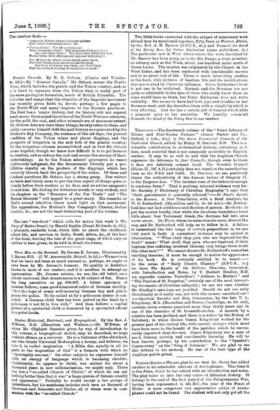Oxford, 2 vols., 21s.) is The Seven Ecumenical Councils of
the Undivided Church, edited by Henry R. Percival, D.D. This is a valuable contribution to ecclesiastical history, containing, as it
does, much material that is not commonly accessible to English readers. It may be as well to add that the Anglican Church expresses its deference to four Councils, though even to these it does not definitely commit itself. The Seventh Council (Niesea II., 787 A.D.) certainly does not stand on the same footing even as the Fifth and Sixth. Dr. Percival, we see, positively denies the authenticity of the famous letters of Gregory II.
to the Emperor Leo. "The insolent tone of the letters is enough to condemn them." That is pushing internal evidisace very far.
Mr. Barmby (" Dictionary of Christian Biography ") Rays that "their genuineness is generally allowed."—St. Paul's Epistle to the Romans. A New Translation, with a Brief Analysis, by W. G. Rutherford. (Macmillan and Co. 35. 6d. net.)—Dr. Ruther- ford does not lack confidence and decision of opinion. He thinks, to put the matter briefly, that while the Jacobean translators knew little about New Testament Greek, the Revisers fell into even worse errors. Dr. Blass, whom wename honoris cause, showed the way, and Dr. Rutherford will help us to follow in it. I failure to understand the late usage of certain prepositions is, we are told, much in fault. A convenient instance may be quoted in illustration. "What shall they gain who are baptised for the dead P means What shall they gain who are baptised, if their baptism (the suffering involved therein) only brings them death like other men ? " We cannot discuss Dr. Rutherford's somewhat startling theories ; it must be enough to notice the appearance of his book. He is certainly entitled to be heard.— In the series of "Early Church °lassies " (S.P.C.K., ls.) we have The Epistle of the Gallican Churches, translated, with Introduction and Notes, by T. Herbert Bindley, B.D. An appendix contains Tertullian's "Address to Martyrs" and "The Passion of St. Perpetua," certainly one of the most interest- ing documents of Christian antiquity; we are not sure whether Mr. Bindley's omissions are justified. Should we not see early Christianity as it really was, not with the creases smoothed out ? —Spiritual Sacrifice and Holy Communion, by the late T. L. Kingsbury, M.A. (Macmillan and Bowes, Cambridge, 42. I3d. net), contains seven sermons preached more than thirty years ago in one of the churches of St. Leonards-on-Sea. A memoir by a relative has been prefixed, and there is a notice by the Bishop of Salisbury, in whose diocese Canon Kingsbury worked for the greater part of his clerical life, with several changes which must have been more to the benefit of the parishes which he succes- sively organised than his own. Canon Kingsbury was a man of much literary activity and considerable learning. He will be best known, perhaps, by his contribution to the "Speaker's Commentary" on the "Song of Solomon." We are glad to see this tribute to his memory. He was of the best type of the Anglican parish priest.


































 Previous page
Previous page